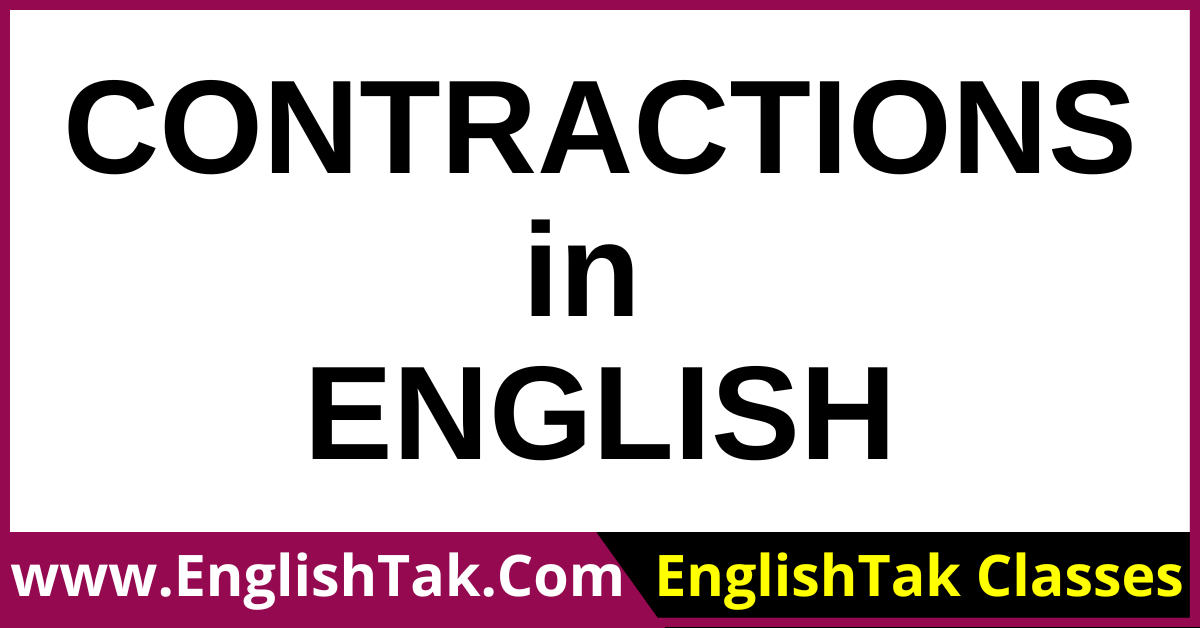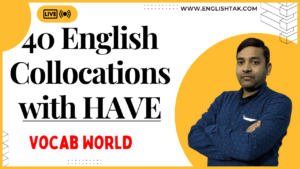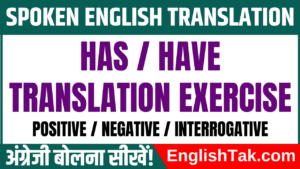![]()
CONTRACTIONS IN ENGLISH
Contraction means to shorten a word or phrase by omitting one or more sounds or letters from it. The word so formed is also called a contraction. Discussed below are the various contractions used in spoken English.
The apostrophe has two uses:
1. To show that we have made words shorter. We have contracted them.
2. To show that something belongs to someone, i.e. they possess it. (possession)
Here are two examples.
• My dad’s car is red.
Here we hive only one dad but we have put on the letter’s’ because we have put an apostrophe. It shows that the car belongs to dad.
• “I’ll tell you that later,” he whispered.
I will has become I’ll, we have joined two words and missed out the letters WI and put in the apostrophe instead.
• We use apostrophes because it can make our writing easier to read.
• In the list below we are going to look at apostrophes for contracting words
| Word + Not/Helping Verb | Contraction Letters | Missed out |
| Can not Do not Should not Could not Would not Has not I will They will He will There is Who is You are They are Would have They have |
Can’t Don’t Shouldn’t Couldn’t Wouldn’t Hasn’t I’ll They’ll He’ll There’s Who’s You’re They’re Would’ve They’ve |
no O O O O O WI WI WI i i a a ha ha |
Let’s start with Let)s. Except for some set phrases (example: ‘Let us pray’) let us is almost always expressed as a contraction: Let)s.
Example:
• Let’s go!
It is almost always used to express an imperative, thus:
• Let’s do it!
However, sometimes it is used to express something like an admonition, thus:
• Let’s do what we ought to do.
Sometimes it is used to make suggestion, thus:
• Let’s keep this just between us.
The negative is ‘let’s not’, but you will also come across ‘don’t let’s’ .
That’s = That is
• That’s all = That is all
• That’s all I want = That is all I want
• That’s it = That is it
• That’s my son = That is my son
• That’s my child = That is my child
• That’s my daughter = That is my daughter
• That’s what I wanted to say = That is what I wanted to say
• That’s a good idea = That is a good idea
What’s = What is
• What’s going on = What is going on?
• What’s that? = What is that?
• What’s happening? = What is happening?
• What’s going to happen? = What is going to happen?
What’s = What has
• What’s been happening? = What has been happening?
• What’s been going on? = What has been going on?
• Couldn’t’ve = Could not have
Because of voicless [t], the sound that follows, ‘-ve’ sounds like of, which is where we get the erroneous spelling -ouldn’t of
it’s = it is
• It’s a man = It is a man
• It’s a woman = It is a woman
• It’s a boy = It is a boy
• It’s a girl = It is a girl
• It’s a good thing = It is a good thing
• It’s not a good thing = It is not a good thing
• It’s time to go = It is time to go
• It’s a good day to die = It is a good day to die
• It’s a good speech = It is a good speech
• It’s hot = It is hot
• It’s cold = It is cold
• It’s winter = It is winter
• It’s summer = It is summer
it’s = it has
• It’s been a good day = It has been a good day
• It’s been one of those days = It has been one of those days
• It’s been good = It has been good
• It’s been fun = It has been fun
• It’s been a wonderful life = It has been a wonderful life
• It’s been a trying time = It has been a trying time
there’s = there is
• There’s one = There is one
• There’s another = There is another
• There’s a red balloon = There is a red balloon
• There’s gold in those hills = There is gold in those hills
• Where there’s water there’s life = Where there is water there is life
• There’s a lot of water in the river = There is a lot of water in the river
NEGATIVE:
• There’s not a lot I can do about it.
• There isn’t much I can do about it.
IRREGULAR CONTRACTIONS:
won’t = will not
Examples:
• I don’t want to do it, so I won’t do it.
• I won’t do it unless you make me do it.
• I won’t promise you anything.
• I won’t do anything.
• Why won’t you help me?
• It won’t work.
• He won’t work.
• She won’t work.
• They won’t work.
• We won’t work.
From those last five sentences, we can plainly see that nobody wants to work.
The nots:
hasn’t = has not
isn’t = is not
don’t = do not
doesn’t = does not
won’t = will not
haven’t = have not
can’t = can not
wouldn’t = would not
shouldn’t = should not
couldn’t = could not
mustn’t = must not
Examples:
• He hasn’t been here in a long time.
• He isn’t here now.
• I don’t know when he will be here.
• He doesn’t know when he will get here.
• I won’t know until he gets here.
• I haven’t been told.
• I can’t find out.
• I wouldn’t tell you if I knew.
• I shouldn’t tell you.
• I couldn’t tell you if I wanted to.
• I mustn’t tell anyone.
+ the BE ‘shan’t’ for ‘shall not’. More and more, ‘shall’ is restricted to questions and formal language, where the contraction would be less likely to occur.
he’s = he is
she’s = she is
it’s = it is
what’s = what is
who’s = who is
there’s = there is
where’s = where is
Examples
• He’s not here = He is not here
• He’s somewhere else = He is somewhere else
• He’s not in his room = He is not in his room
• He’s not answering the phone = He is not answering the phone
• He’s from France = He is from France
• He’s not my brother = He is not my brother
• He’s asleep = He is asleep
• He’s not awake = He is not awake
• She’s here = She is here
• She’s well = She is well
• She’s quick = She is quick
• She’s from Canada = She is from Canada
• She’s living in Japan = She is living in Japan
• She’s my friend = She is my friend.
• She’s not my sister = She is not my sister
• She’s sleeping on satin sheets = She is sleeping on satin sheets
• It’s a good thing = It is a good thing
• It’s morning = It is morning
• It’s time to get up = It is time to get up
• It’s dark outside = It is dark outside
• It’s going to be a rainy day = It is going to be a rainy day
• What’s that? = What is that?
• What’s the matter? = What is the matter?
• What’s the time? = What is the time?
• What’s for breakfast? = What is for breakfast?
• Who’s there? = Who is there?
• Who’s that? = Who is that?
• Who’s calling? = Who is calling?
• I don’t know who’s driving the bus = I don’t know who is driving the bus
• There’s a freckle on your face = There is a freckle on your face
• There’s a woman in the race = There is a woman in the race
• There’s a girl whose name is Grace = There is a girl whose name is Grace
• Where’s my hat? = Where is my hat?
• Where’s my wallet? = Where is my wallet?
• Where’s my head? = Where is my head?
• Where is the train? = Where is the train?
he’s = he has
she’s = she has
it’s = it has
what’s = what has
who’s = who has
there’s = there has
where’s = where has
Examples
• He’s been my friend = He has been my friend
• He’s not struggled = He has not struggled
• He’s never been helpful = He has never been helpful
• He’s always been a nuisance = He has always been a nuisance
• He’s never bled = He has never bled
• He’s never been dead = He has never been dead
• He’s been here since last Tuesday = He has been here since last Tuesday
• She’s been here before = She has been here before
• She’s been to the store = She has been to the store
• She’s been asleep for an hour = She has been asleep for an hour
• She’s had the power = She has had the power
• It’s been fun = It has been fun
• It’s been a good day = It has been a good day
• What’s been going on? = What’s been going on?
• What’s been going on here? = What’s been going on here?
• Who’s been sleeping in my bed? Who has been sleeping in my bed?
• Who’s taken my keys? = Who has taken my keys?
• There’s been someone in my room = There has been someone in my room
• Where’s he been? = Where has he been?
• Where’s the time gone = Where has the time gone?
I’ll = I will
we’ll = we will
she’ll = she will
he’ll = he will
they’ll they will
you’ll = you will
Examples
• I’ll be right back.
• We’ll be there in a little while.
• She’ll be riding a white horse.
• He’ll see you now.
• You’ll be sorry for that.
I’m =I am
• I’m twenty years old = I am twenty years old
• I’m looking forward to it = I am looking forward to it
• I’m not looking forward to it = I am not looking forward to it
• I’m not going with you = I am not going with you
• I’m a man = I am a man
• I’m your friend = I am your friend
• I’m nearly forty = I aJJl nearly forty
• I’m an American = I am an American
• I’m going to come back = I am going to come back
• I’m blessed with a wonderful family = I am blessed with a wonderful family
• I’m behind him 100 percent = I am behind him 100 percent
[yarpp]
CONTRACTIONS IN ENGLISH
you’re = you are
we’re = we are
they’re = they are
Examples
• You’re supposed to be there at eight = You are supposed to be there at eight
• We’re meeting them at nine = We are meeting them at nine
• They’re supposed to meet us at the station = They are supposed to meet us at the station
I’d = I would
I’d like to meet her = I would like to meet her
I’d = I had
I’d been doing well until I got hit by a car = I had been doing well until I got hit by a car
you’d = you would
If you lived here you’d be home by now = If you lived here you would be home by now
you’d = you had
You’d better watch out! = You had better watch out!
We’d = we had
We’d better be getting back = We had better be getting back
we’d = we would
We’d like to do it again some time = We would like to do it again some time
she’d = she had
he’d = he had
• She’d better listen if she knows what’s good for her = She had better listen if she knows what’s good for her
• He’d better be more careful = He had better be more careful she’d = she would
Suggested For You |
|
| Grammar | EnglishTak YouTube Channel |
| Spoken English | Videos |
| Ranjan Sir Blog | Join Our WhatsApp Group |
[yarpp]
CONTRACTIONS IN ENGLISH
he’d = he would
• She’d like to go to the concert = She would like to go to the concert
• He’d like to meet her = He would like to meet her
• She’d like to go to college = She would like to go to college
• He’d be better off not going = He would be better off not going
how’d = how did
How’d he do that? = How did he do that?
I’ve = I have
• I’ve been waiting for an hour = I have been waiting for an hour
• I’ve got something to say = I have got something to say
• I’ve gotten a letter from my sister = I have gotten a letter from my sister
• I’ve been looking forward to hearing from her = I have been looking forward to hearing from her
• I’ve been wanting to talk to you = I have been wanting to talk to you
• That’s what I’ve been thinking = That’s what I have been thinkmg
we’ve = we have
• We’ve been there before = We have been there before
• We’ve seen that movie already = We have that movie already
• We’ve go to see that one = We have got to see that one
• We’ve been waiting in line for an hour = We have waiting in line for an hour
you’ve = you have
• You’ve been told not to do that = You have been told not to do that
• You’ve been there before, haven’t you? = You have been there before, haven’t you?
• You’ve earned a reprimand = You have earned a reprimand
• You’ve been misbehaving = You have been misbehaving
• You’ve seen her before, haven’t you? = You have seen her before, haven’t you?
• You’ve been quite helpful = You have been quite helpful
could’ve = could have
• I could’ve done it if I had wanted to do it = I could have done it if I had wanted to do it
• I could’ve done it, but I didn’t do it = I could have done it, but I didn’t do it
would’ve = would have
• I would’ve finished had I had the time = I would have finished had I had the time
• I would’ve got there sooner, but the train was late = I would have got there sooner, but the train was late
• We would’ve had the picnic had it not rained = We would have had the picnic had it not rained
should’ve = should have
• She should’ve introduced herself = She should have introduced herself
should’nt’ve = should not have (primarily spoken)
• She should’nt’ve introduced herself = She should not have introduced herself
what’d = what did
What’d he say? = What did he say?
that’ll = that will
That’ll be all = That will be all
It’ll = It will
It’ll be a while = It will be a while.
That’ll = That will
• That’ll be the day = That will be the day.
• That’ll never happen again = That will never happen again.
[yarpp]
CONTRACTIONS IN ENGLISH
Which’ll = Which will
The bus, which’ll be along in a while, will take you to the station. = The bus, which will be along in a while, will take you to the station.
ain’t = am not
I ain’t going and you can’t make me.
There’re = There are
There’re some words that have no opposites = There are some words that have no opposites
needn’t = need not
• “John needn’t leave for another hour.”
• “You needn’t have done that.”
Who’re = who are
Who’re you? = Who are you?
What’re = What are
What’re you doing? = What are you doing?
What’ll = what will
What’ll you be having? = What will you be having?
you’re = you are
You’re dizzy and I’m busy = You are dizzy and I am busy.
it’ll = it will
I’m sorry. It’ll never happen again = I am sorry. It will never happen again.
that’ll = that will
That’ll be all = That will be all
that’d = that would
That’d be nice = That would be nice
what’d = what did
What’d you do on your vacation? = What did you do on your vacation?
what’d = what would
What’d be the best thing to do? = What would be the best thing to do?
it’d = it had
It’d better be good = It had better be good
it’d = it would
It’d be a nice thing to do = It would be a nice thing to do
[yarpp]
You Must Read:
Five Tips to Improve Vocabulary
Basic English Verbs Hindi Meaning – Day – 1
Basic English Verb Hindi Meaning Day-2
125 Daily Use English Words with Hindi Meaning
Occupations Names English Hindi Meaning





